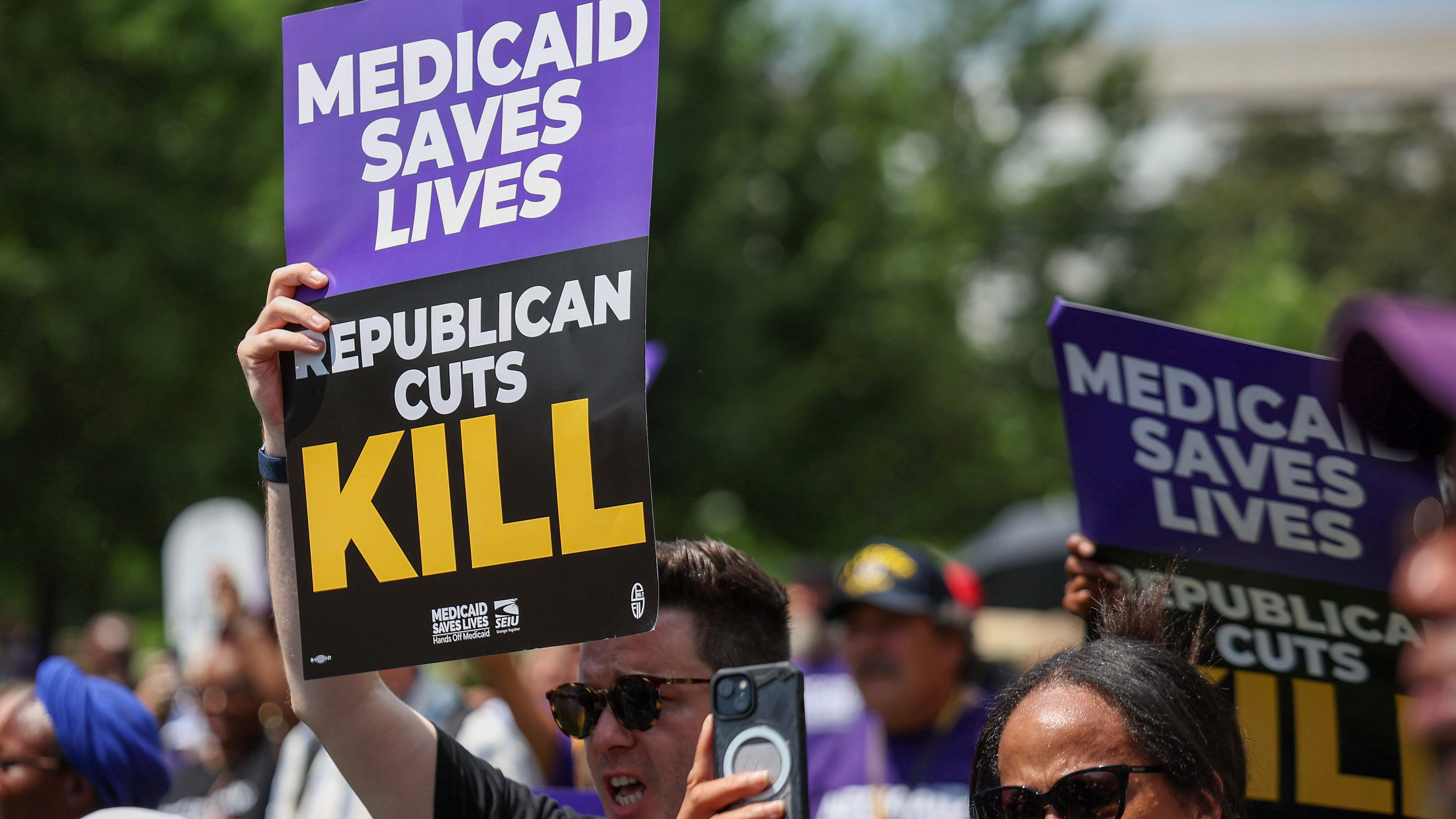
How Trump’s sweeping tax, spending, policy bill affect Medicaid
The House of Representatives passed President Donald Trump’s sweeping tax, spending and policy bill, and Medicaid is expected to be heavily impacted.
Millions of Americans who get health insurance through Medicaid will face new hurdles after the House passed President Donald Trump’s massive tax cut and spending bill, which includes deep cuts to nation’s safety-net health insurance program.
Trump’s marquee bill extends the 2017 tax cuts, ends taxes on tips and overtime and bolsters border security. It also takes aim at Medicaid, the federal and state health program that covered 78.6 million low-income children and adults as of March 2025, according to the Centers for Medicare & Medicaid Services.
The bill, approved by the Senate on July 1 and the House on July 3, is projected to cut $1 trillion mostly from Medicaid and Affordable Care Act insurance plans and eliminate insurance coverage for 11.8 million people over the next decade, according to the nonpartisan Congressional Budget Office.
Another 5 million could lose health insurance because the bill doesn’t extend former President Joe Biden’s COVID-19 pandemic-era tax credits that made Affordable Care Act plans cheaper for consumers, according to a previous CBO analysis.
Health policy experts say the legislation amounts to a partial rollback of the health insurance gains under former President Barack Obama’s signature 2010 health care law, the Affordable Care Act, also known as Obamacare.
“It’s a giant step backwards from the vision of universal coverage that was President Obama’s legacy achievement in the Affordable Care Act,” said Joan Alker, a research professor and executive director and co-founder of Georgetown University’s Center for Children and Families.
But Republicans say the Medicaid overhaul is vital to protect taxpayers while motivating nondisabled Medicaid recipients to seek work to maintain their coverage.
Shortly before the House advanced the bill to Trump’s desk, Speaker Mike Johnson said work requirements will “restore dignity and purpose to those on taxpayer funded benefits.”
How would the bill change Medicaid?
The Affordable Care Act established federal and state exchanges where people can purchase subsidized health insurance plans. Obama’s health law also gave states the option to expand Medicaid to eligible residents who earn up to 138% of the federal poverty level − or $21,597 for an individual.
A total of 40 states and Washington D.C. have expanded Medicaid under the ACA. Ten states, including Florida and Texas, haven’t expanded Medicaid.
Now, under the GOP bill, those Medicaid expansion states will be required to double eligibility checks to twice a year and set up systems to verify a person’s employment or exemption status.
The legislation requires “able-bodied” Medicaid recipients to work 80 hours a month or qualify for an exemption, such as being a student, caregiver or having a disability. The job checks will apply to parents of children older than 13.
Medicaid: Where you live matters
The GOP bill requires the twice-a-year eligibility and job verification checks to be in place by the end of 2026. So by January 2027, the legislation mandates states should begin these checks.
However, language in the Senate version allows the Health and Human Services Secretary Robert F. Kennedy to extend “good faith” waivers to allow states more time to implement work requirement checks, Alker said.
States also might choose to launch work requirements sooner by submitting a waiver to CMS, the federal agency that oversees Medicare and Medicaid.
During the first Trump administration, 13 states sought a Medicaid work requirement. Arkansas was the only state during Trump’s first term to implement a work requirement and remove people from coverage − shedding more than 18,000 residents from Medicaid within the first seven months of the program before a federal court order ended the work requirement.
Georgia − among the 10 states that didn’t broadly expand Medicaid to nondisabled, low-income adults − is the only state currently with a Medicaid work requirement. Georgia Pathways extends Medicaid to eligible adults who work at least 80 hours a month or qualify for exemptions such as being full-time students or volunteers. The Biden administration stalled the program, but Georgia sued and the program began enrolling people in 2023.
Fewer than 7,500 Georgians had secured Medicaid under Georgia’s Pathways program as of April 30, according to data analyzed by the Georgia Budget & Policy Institute.
States also might be motivated to act sooner because the bill changes how many states fund their portion of Medicaid. States have adopted “provider taxes” that assess taxes on hospitals and other health providers to leverage larger Medicaid payments from the federal government.
The GOP bill freezes the current tax rates and in 2028 will require states to reduce provider taxes to 3.5%, down from the current limit of 6%. Although the bill doesn’t require states to begin curtailing provider taxes until 2028, some states might choose to act sooner to address potential budget gaps.
“States are going to anticipate that loss of revenue and will be looking to make changes,” said Jennifer Tolbert, deputy director of the program on Medicaid and the uninsured for KFF, a health policy nonprofit.
Consumer advocates: Medical debt concerns mount
Consumer advocates said the loss of health insurance for millions of American will likely cause more people to take on medical debt.
Medical bills accounted for more than half of debt collection on consumers’ credit records, according to a 2022 report from the Consumer Financial Protection Bureau.
Before Biden left office, the CFPB finalized a medical debt rule that would ban medical debt on credit reports and prohibit lenders from using a person’s medical debt history to make lending decisions.
The three largest credit reporting companies already agreed to remove unpaid medical debts less than a year old and medical debt less than $500. The Biden rule would have eliminated larger debts, too. But, the CFPB is seeking to erase the rule that would ban the inclusion of all medical debt on credit reports.
The CFPB had layoffs earlier this year, and the GOP bill will further slash funding for the consumer protection agency.
The combination of a weakened consumer watchdog agency and the loss of health insurance coverage will harm consumers, said Sally Greenberg, CEO of the National Consumers League.
“Consumers are going to pay − and patients are going to pay big time,” Greenberg said.










